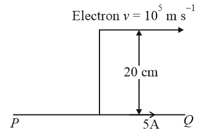Embibe Experts Solutions for Chapter: Magnetic Effects of Current and Magnetism, Exercise 1: AIPMT - 25th July 2015
Embibe Experts Physics Solutions for Exercise - Embibe Experts Solutions for Chapter: Magnetic Effects of Current and Magnetism, Exercise 1: AIPMT - 25th July 2015
Attempt the free practice questions on Chapter 14: Magnetic Effects of Current and Magnetism, Exercise 1: AIPMT - 25th July 2015 with hints and solutions to strengthen your understanding. EMBIBE CHAPTER WISE PREVIOUS YEAR PAPERS FOR PHYSICS solutions are prepared by Experienced Embibe Experts.
Questions from Embibe Experts Solutions for Chapter: Magnetic Effects of Current and Magnetism, Exercise 1: AIPMT - 25th July 2015 with Hints & Solutions
Given below are two statements:
Statement I : Biot-Savart's law gives us the expression for the magnetic field strength of an infinitesimal current element of a current carrying conductor only.
Statement II : Biot-Savart's law is analogous to Coulomb's inverse square law of charge , with the former being related to the field produced by a scalar source, while the latter being produced by a vector source, .
In light of above statements choose the most appropriate answer from the options given below:
A long solenoid of radius has per . If current flows in the solenoid, the magnetic field strength at the centre of the solenoid is:
From Ampere's circuital law for a long straight wire of circular cross-section carrying a steady current, the variation of magnetic field in the inside and outside region of the wire is
An infinitely long straight conductor carries a current of as shown. An electron is moving with a speed of parallel to the conductor. The perpendicular distance between the electron and the conductor is at an instant. Calculate the magnitude of the force experienced by the electron at that instant.

A thick current carrying cable of radius carries current uniformly distributed across its cross-section. The variation of magnetic field due to the cable with the distance from the axis of the cable is represented by:
A uniform conducting wire of length and resistance is wound up as a current-carrying coil in the shape of,
(i) an equilateral triangle of side .
(ii) a square of side .
The magnetic dipole moments of the coil in each case respectively are:
In the product
For and and
What will be the complete expression for ?
A wire of length metre carrying a current of ampere is bent in the form of a circle. Its magnetic moment is,
